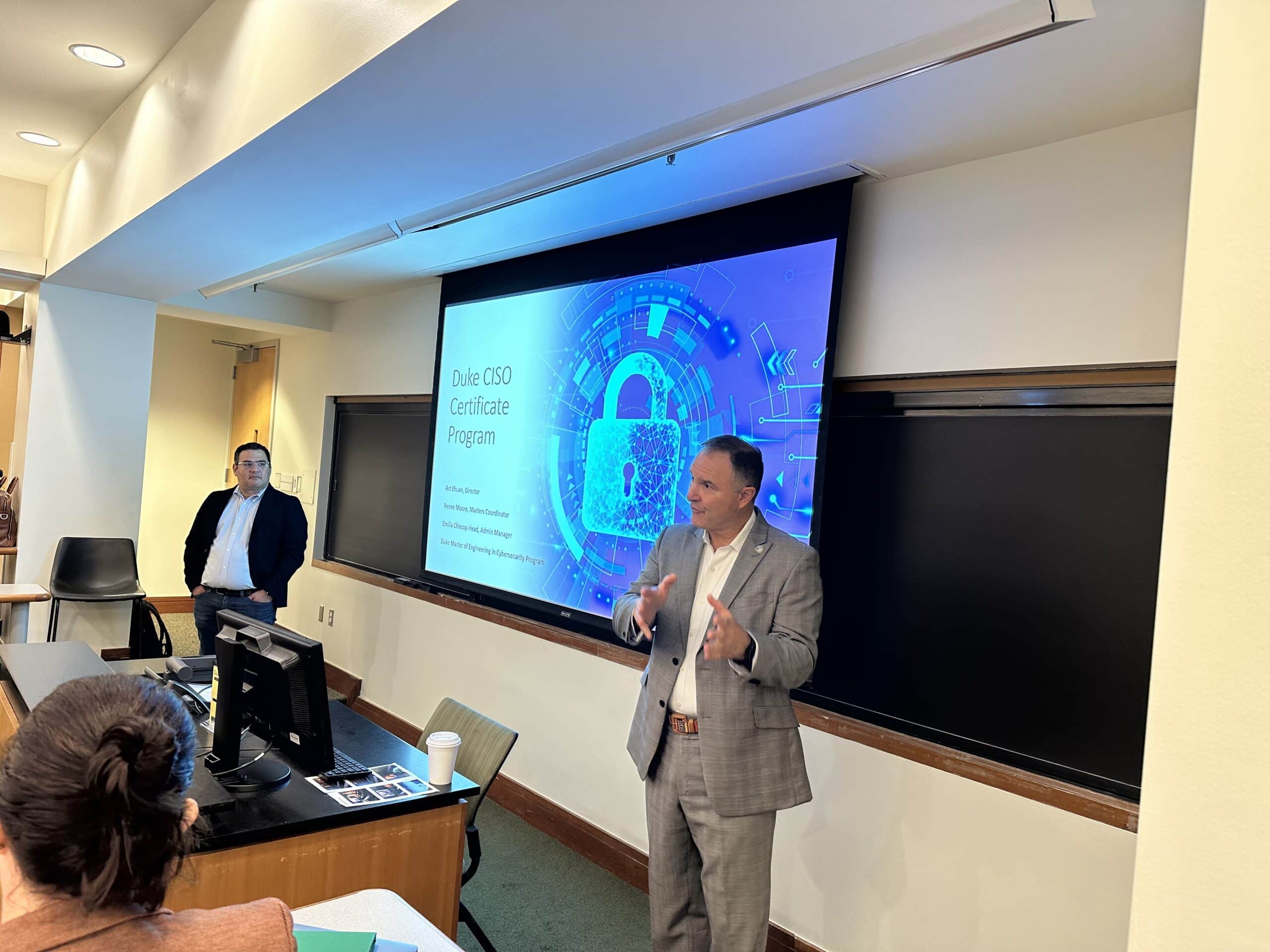Duke CISO Executive Certificate Speaker Spotlight: Belisario Contreras, Senior Director at Venable
By Emilia Chiscop-Head
Guest speaker of the Duke CISO Executive Certificate discusses cybersecurity challenges and the role of the Duke CISO Certificate program

“I am honored to say that I have been able to influence and learn from the development of cybersecurity capacities in almost every Latin American and Caribbean country”
Belisario Contreras, Senior Director of Global Security and Technology Strategy at Venable LLP, member of the Duke Master in Cybersecurity Advisory Board, and guest speaker of the Duke CISO Executive Certificate discusses cybersecurity challenges and how the Duke CISO Certificate program has been designed to help executives and government officials overcome them.
– How does the Duke CISO Executive Program fit into the cyber landscape? What is the potential impact on the future of the cybersecurity profession?
The Duke CISO Executive Program is designed to provide high-quality education and training to cybersecurity leaders, ensuring they have the latest knowledge and skills. The program is tailored to address current and emerging threats, making it highly relevant in today’s rapidly evolving cyber landscape. The program focuses on developing strategic leadership skills for CISOs navigating complex organizational and technological environments. Additionally, the program enables participants to network with peers and industry experts, fostering collaboration and innovation. By equipping CISOs with advanced skills and knowledge, the program can significantly enhance organizations’ overall security posture, contributing to a more secure digital ecosystem.
– Name two lessons you would like the CISO learners to have taken with them after your talk.
Risk Management: CISOs should understand that effective cybersecurity involves more than just technology; it’s also about managing risks. CISOs must assess and prioritize risks to align their security strategies with business objectives.
Continuous Learning and staying updated with the latest cybersecurity trends, threats, and technologies. Continuous education and adaptability are vital to maintaining a robust security posture.
– How have you decided to become a Cyber professional, and why?
I developed an interest in technology and security at a young age. I am fascinated by how they impact our lives and how they can be safeguarded. Observing the rising frequency and complexity of cyber threats made me recognize the critical importance of cybersecurity, motivating me to seek a career where I could make a substantial difference.
– What was more important to you for becoming who you are today?
I have built relationships with experienced and trustworthy peers who have provided guidance and support throughout my career. I am also committed to continuous learning to stay current with industry developments, which has enhanced my expertise and adaptability.
– Name one thing you wished you knew when beginning your cyber career.
Soft communication, leadership, and teamwork skills cannot be underestimated. They are essential for effectively managing teams and communicating with non-technical stakeholders.
– Briefly describe one important accomplishment in your cyber career or a highly impactful action that you took.
I am honored to say that I have been able to influence and learn from the development of cybersecurity capacities in almost every Latin American and Caribbean country.
– Can you name two major challenges in cybersecurity today and how an executive program like this can help overcome them?
One major challenge is changing the organizational mindset. The Duke CISO Executive Program focuses on the strategic importance of cybersecurity. As cybersecurity has become the focus of top executives and boards of directors, CISOs need to learn how to communicate effectively with that audience, emphasizing the impact of cyber risks on the organization’s bottom line and overall success.
Another major challenge is the evolving threat landscape: Cyber threats are constantly changing and becoming more sophisticated, making them difficult to detect. The program provides CISOs with the latest knowledge and skills to better protect their organizations.
About Belisario Contreras:
Belisario Contreras describes himself as a thought leader and contributor in the cybersecurity space.
He has contributed advice and expertise to high-level government officials, executives, and civil society leaders and is also a member of the Duke Master of Engineering in Cybersecurity Industry Advisory Board. In this role, Mr. Contreras informs curricular decisions and inspires Duke Cybersecurity students to become leaders in Cybersecurity. Belisario Contreras is also the head of the Organization of American States (OAS) cybersecurity program.
Belisario’s experience is recognized by top-tier organizations such as the World Economic Forum (WEF), where he was invited to serve on the Advisory Board of the Centre for Cybersecurity (C4C) and to co-chair the Global Future Council of Cybersecurity. At the Carnegie Endowment for International Peace, he provided strategic guidance as part of the FinCyber Initiative High-Level Advisory Group. Currently, as the coordinator of the Digi Americas Alliance and a member of the advisory boards at Duke University and (ISC)² LATAM, he continues to contribute to shaping the global cybersecurity agenda. Read his full bio.
